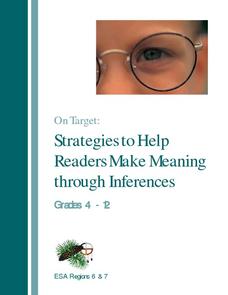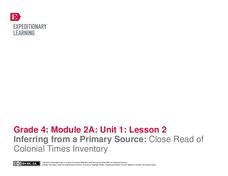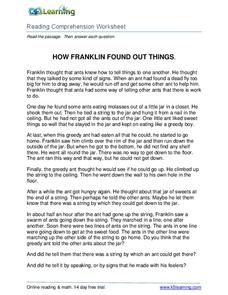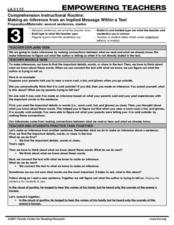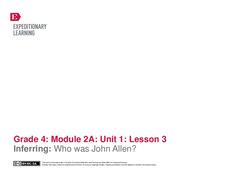Curated OER
On Target: Strategies to Help Readers Make Meaning through Inferences
Here's a resource that explicitly teaches, models, and provides readers with opportunities to practice the process of drawing inferences from text. Packed with strategies elementary, middle, and high school teachers can use, the resource...
K12 Reader
What Do You See? (Inferences)
Making inferences is a skill that goes beyond the comprehension of written text. In this simple exercise, young learners are provided with a photograph and asked to answer a series of inference questions using only on the information...
Have Fun Teaching
Making Inferences (7)
Why did Carla shut the window? Why did Benny feed his puppy? Why did the train blow its whistle? Why did Mom's car have a flat tire? Young readers consider cause and effect relationships in order to draw inferences from four situations...
Reading Worksheets
Inferences Worksheet 9
Help your pupils take charge of their inferring abilities with an exercise designed for direct practice with making and supporting inferences. Learners read four short passages and answer two to three questions for each passage that...
Have Fun Teaching
Making Inferences (6)
The story of Petey and Ralphie provides readers with the perfect opportunity to practice using clues in a text to draw inferences. The questions that follow the story direct readers' attention to details that imply rather than directly...
Have Fun Teaching
Making Inferences (1)
Provide readers with an opportunity to practice drawing inferences by giving them this worksheet. Kids identify the text and author, record a sentence they believe infers rather than directly says, and then write the deeper meaning the...
E Reading Worksheets
Making Predictions #1
How can you tell what is going to happen next in a story? Learn to make predictions with five sections of stories. Kids read the beginning, and then write what they believe will happen next. Additionally, they provide evidence for their...
Pearson
Making Inferences
The ability to make inferences is an important skill. Provide your class with some practice. This resource includes several different passages with which learners are required to practice inferring. They read each passage and respond to...
Polk Bros Foundation
I Can Infer Predictions Based on an Analysis of Motive
Use a character or person's motivation as the basis for a prediction of that character or person's next action. Pupils select an individual from their reading, copy a quote, write down an inference about that character's motives, and...
Curated OER
Mini-Lesson Planning for Inferences
Making inferences and drawing conclusions is a key component to successful active reading. Encourage your class to use context clues and prior knowledge to infer different elements of a story, including the setting, plot, and character...
Bethel School District
Observations and Inference
What's the difference between qualitative and quantitative observations? Learners make observations, inferences, and predictions about their environment with a set of questions and activities that are applicable to either language arts...
Have Fun Teaching
You Make the Call (10)
What will happen next? Young writers plot what will happen next after studying the clues in four story starters.
EngageNY
Taking Notes Using a Graphic Organizer: Inferring About Work and Play in Colonial America
What was life like in colonial America? Follow this lesson and your pupils will find out what people in colonial times did for work and for fun. Ask learners to compare and contrast the two texts and explain what the reading helped them...
EngageNY
Taking Notes Using a Graphic Organizer: Inferring About the Importance of Religion in Colonial America
Improve class understanding of colonial times by reading an informational text and filling out the accompanying graphic organizer. Class members work with a partner to read, take notes, make inferences, and synthesize information.The...
EngageNY
Inferring from a Primary Source: Close Read of Colonial Times Inventory
Teach your class about colonial America through an examination of primary documents. First though, start vocabulary notebooks for content-specific and academic vocabulary. Pupils can keep this record during the entire module. Once this...
K5 Learning
How Franklin Found Out Things
Franklin learns about the world by making observations, and so do we! A short reading assignment prompts fourth graders to answer comprehension questions about a curious boy and what he notices.
Curated OER
Making Regolith
You may not be able to take a field trip to the moon, but that doesn't mean your class can't study moon rocks. Using graham crackers as the moon's bedrock and powdered donuts as micrometeorites, young scientists simulate the creation of...
Curated OER
Making an Inference from an Implied Message Within a Text
Show your scholars that they make inferences every day and might not even know it. Through scaffolded instruction, they break down the process of drawing information from context. Using example sentences and didactic questioning,...
EngageNY
Inferring: Who was John Allen?
Help your learners work with difficult or archaic words. A continuation of lesson two of this module, the plan here focuses on deciphering the Inventory of John Allen, in particular the unfamiliar words that make up much of the list. Add...
Curated OER
Archeology Lesson; Making Inferences
Students discover what an archeologist is and make inferences about societies and cultures based on artifacts. In this archeology lesson, students complete an array of captivating activities, guessing about what an artifact is and what...
K12 Reader
Visual Clues
Whether you realize it or not, reading an image and reading a text require similar skills, including the ability to make inferences. For this simple activity, children look at a picture of a snowy winter day and answer a series of...
Have Fun Teaching
When Am I? (16)
How can you tell when a story takes place? Use context clues to infer the time of day and seasons of five short reading passages. Kids then note each passage's time period as daytime or nighttime, as well as winter or summer.
Have Fun Teaching
Making Inferences (8)
Kids examine the clues provided by a prompt to infer what will happen next. They then illustrate the short story.
Curated OER
Rock Art Caves
Fourth graders research the rock art caves that are found in Texas. In this rock art lesson, 4th graders use assigned web sites to find information about the rock art that is found in caves in Texas. They work in small groups to make a...


